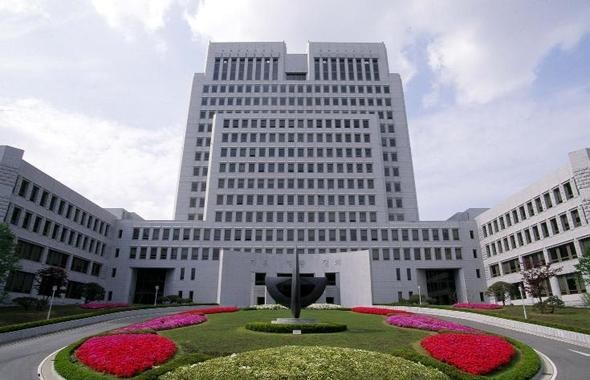hankyoreh
Links to other country sites 다른 나라 사이트 링크
Supreme Court upholds innocence of S. Koreans who traded with N. Korea

The Supreme Court has upheld a ruling acquitting two traders of allegedly attempting to pass GPS jammer data to North Korea in June 2012.
The verdict appears likely to cause further controversy for police and prosecutors over yet another overzealous investigation resulting in false accusations.
The Supreme Court’s second division, under Justice Cho Dae-hee, announced on Apr. 8 that it had upheld an original trial ruling finding the two businessmen - a 60-year-old surnamed Kim and a 78-year-old surnamed Lee - not guilty of violating the National Security Law.
According to the ruling text and trial proceedings, Kim and Lee were in the Chinese city of Dandong preparing for a venture trading in North Korean pine mushrooms in July 2015 when a disagreement over contractual relations resulted in their relationship going sour. Lee ended up under investigation after Kim reported him to the Seoul Metropolitan Police Agency security investigation squad for allegedly meeting with and receiving orders from North Korean agents.
Police and prosecutors claimed at the time that Lee had attempted to intercept confidential military information on GPS jamming devices, electromagnetic wave detectors, and high-altitude observation radar and deliver it to North Korea, acting on orders for Pyongyang. Kim also ended up under investigation over activities related to the pro-Pyongyang Association of Koreans in New Zealand.
But the “confidential military information” police and prosecutors accused Lee of trying to pass on was found to consist of pamphlets accessible to the general public over the internet - leading the court to focus more on the possibility that Kim had exaggerated to investigators due to hard feelings against Lee. For their investigation and case, police and prosecutors depended mostly on Kim’s unsubstantiated claims and indicted both men despite Lee’s protestations that he was not a spy.
In its ruling, the first trial court noted that the two men had “had a dispute over costs and profits in connection with the pine mushroom venture.”
“Given the substantial grounds for concluding that [Kim’s testimony] lacked rationality, objective correspondence, and consistency, it cannot be regarded as evidence of guilt,” the court said at the time.
The second trial court reached a similar conclusion.
“The prosecutors’ claim that Kim Myeong-hwan, former representative of the Dandong chapter of the National Economic Cooperation Federation, was a ‘North Korean agent contacted by Mr. Lee’ was found, in terms of Mr. Kim’s testimony in court, to have been based on something of a logical leap on the conjecture that the person contacted by Mr. Lee must have been a North Korean agent,” it said.
The Supreme Court announced that it was “fully upholding the verdict from the first trial, in which [Kim and Lee] were ruled not guilty for the reasons stated in the judgment, namely that there was no evidence of violation of the National Security Law [espionage] among the charges against the defendants in this case.”
In a telephone interview with the Hankyoreh after the verdict on Apr. 8, Lee said he had “been humiliated by the state all this time.”
“All of my ventures since the indictment have gone under. The pain continues for me even now,” he said.
By Heo Jae-hyun, staff reporter
Please direct questions or comments to [english@hani.co.kr]

Editorial・opinion
![[Column] Park Geun-hye déjà vu in Yoon Suk-yeol [Column] Park Geun-hye déjà vu in Yoon Suk-yeol](https://flexible.img.hani.co.kr/flexible/normal/500/300/imgdb/original/2024/0424/651713945113788.jpg) [Column] Park Geun-hye déjà vu in Yoon Suk-yeol
[Column] Park Geun-hye déjà vu in Yoon Suk-yeol![[Editorial] New weight of N. Korea’s nuclear threats makes dialogue all the more urgent [Editorial] New weight of N. Korea’s nuclear threats makes dialogue all the more urgent](https://flexible.img.hani.co.kr/flexible/normal/500/300/imgdb/original/2024/0424/7317139454662664.jpg) [Editorial] New weight of N. Korea’s nuclear threats makes dialogue all the more urgent
[Editorial] New weight of N. Korea’s nuclear threats makes dialogue all the more urgent- [Guest essay] The real reason Korea’s new right wants to dub Rhee a founding father
- [Column] ‘Choson’: Is it time we start referring to N. Korea in its own terms?
- [Editorial] Japan’s rewriting of history with Korea has gone too far
- [Column] The president’s questionable capacity for dialogue
- [Column] Are chaebol firms just pizza pies for families to divvy up as they please?
- [Column] Has Korea, too, crossed the Rubicon on China?
- [Correspondent’s column] In Japan’s alliance with US, echoes of its past alliances with UK
- [Editorial] Does Yoon think the Korean public is wrong?
Most viewed articles
- 1[Column] Park Geun-hye déjà vu in Yoon Suk-yeol
- 2Thursday to mark start of resignations by senior doctors amid standoff with government
- 3N. Korean hackers breached 10 defense contractors in South for months, police say
- 4[Editorial] New weight of N. Korea’s nuclear threats makes dialogue all the more urgent
- 5Will NewJeans end up collateral damage in internal feud at K-pop juggernaut Hybe?
- 6Kim Jong-un expressed ‘satisfaction’ with nuclear counterstrike drill directed at South
- 7[Editorial] Japan’s rewriting of history with Korea has gone too far
- 8[Column] ‘Choson’: Is it time we start referring to N. Korea in its own terms?
- 9[Cine feature] A new shift in the Korean film investment and distribution market
- 10[Column] The clock is ticking for Korea’s first lady